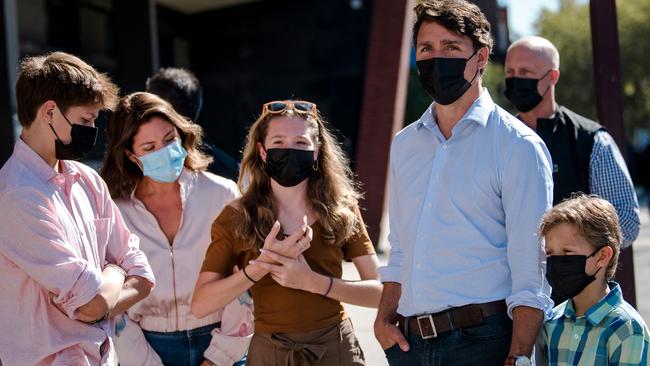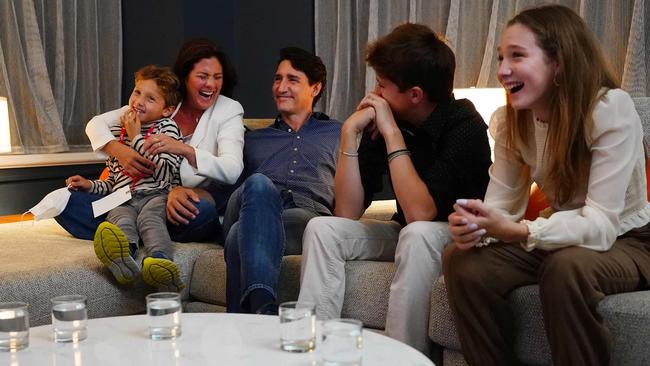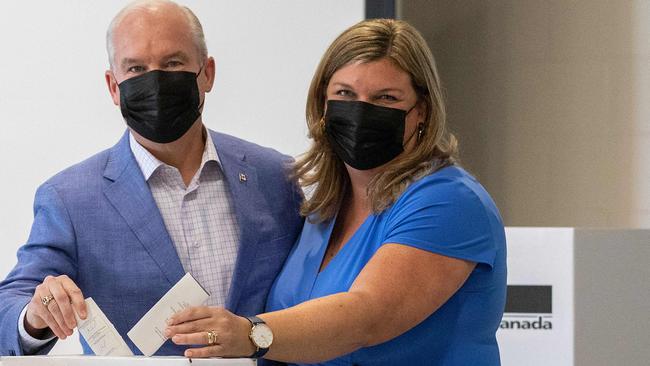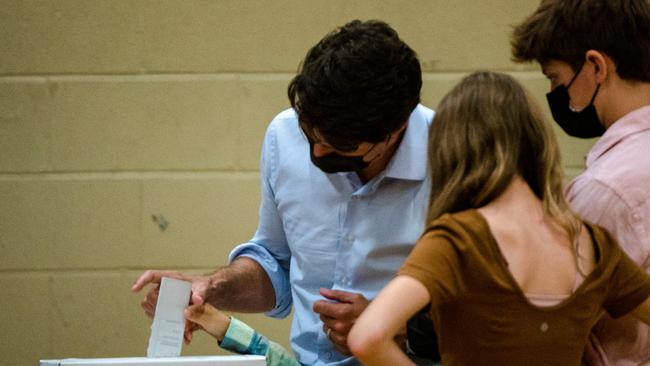Justin Trudeau’s Liberals win Canada election
Canadian Prime Minister Justin Trudeau was headed toward a third straight electoral victory on Tuesday, although a majority government failed to materialise in counting.

Canadian Prime Minister Justin Trudeau was headed toward a third straight electoral victory on Tuesday, although his bet that a snap vote would help him secure a majority government failed to materialise in counting.
Both Canada’s CTV Network and the Canadian Broadcasting Corp projected the incumbent Liberal Party was set to win enough seats in parliament to form a minority government.
Preliminary results indicated the results from Monday’s election were a mirror image of what the previous election, in 2019, produced.
The Liberals were leading in 156 electoral districts, short of the 170 needed for a majority in parliament. The Conservative Party, led by Erin O’Toole, was running second with 122 seats. The results are based on over 90% of polls reporting and officials continue to tally votes — including about a million mail-in ballots. When the election was called, the Liberals held 155 seats and the Tories had 119.
While the Liberals have secured re-election, a minority result will be viewed as a setback. This will force Mr Trudeau to rely on another party — perhaps the left-leaning New Democratic Party — to help implement a progressive agenda with a focus on expanded child care, affordable housing and climate change.
In Montreal, Mr Trudeau said he was ready to fulfil his party’s promises and help end the Covid-19 pandemic’s hardship on households.

Since the last election in October 2019, Mr Trudeau has led a minority government, requiring support from other parties to get legislation passed. A majority in Monday’s election would allow Mr Trudeau to push through his agenda without having to strike deals with opposition parties. It also would give his party control over parliamentary committees, whose investigations into financial ties between the prime minister’s family and a youth charity, as well as alleged sexual misconduct among military leadership, have proved politically embarrassing.
Mr Trudeau has framed the election as a pivotal moment in the country’s history. “We have big decisions to make based on what we learned from this pandemic,” he said this past week.
Polling over the weekend indicated Mr Trudeau’s Liberals and the Conservative Party were in a tight race, with the possibility that Liberals could lose seats in parliament instead of gaining a majority. Mr Trudeau’s main political rivals and some voters have blasted the prime minister for putting his own political interests ahead of the public, which remains preoccupied with Covid-19.
A poll issued last week from Ipsos Global Public Affairs indicated over two-thirds of respondents said this was the wrong time to have an election. Anger over the election call “is an anvil that Trudeau has had strapped to his waist as he tried to swim across this election moat,” said Darrell Bricker, Ipsos chief executive.

Julia Maurik, a resident in Toronto’s West End, said Monday that the election didn’t need to be called and called the exercise a waste of taxpayers’ money. “Everybody’s walking around with masks on, voting in a pandemic,” she said, outside a church where voting took place. “I’m not sure the country needs this.”
She said she believes Mr Trudeau’s early-election call was likely motivated by polling numbers, as opposed to the prime minister’s argument that it was time to give voters a say on what post-pandemic Canada should look like. “He’s putting a spin on a decision that was opportunistic,” she said.
Mr Trudeau has declined to answer reporters’ questions on the campaign trail about his future in the event he did not win a majority.
“I am not done fighting for Canadians,” Mr Trudeau said on Sept. 3, when asked if he would remain Liberal leader if his party lost.
Donald Trump lost the 2020 US presidential election in part because of his administration’s handling of the pandemic. Though Mr Trudeau received high marks among Canadians for managing the public-health crisis, that seemingly hasn’t helped on the campaign trail.

“Adequate pandemic management is no longer sufficient to win re-election in the post-Covid world,” said Daniel Béland, a political-science professor at Montreal’s McGill University.
Mr Béland pointed out that voters in the Canadian province of Nova Scotia ousted the incumbent Liberals in an election last month, even though the province’s Covid-19 strategy earned widespread praise.
Other factors are weighing on Mr Trudeau, Mr Béland and pollsters say. Chief among them, analysts say, is Mr Trudeau’s personal popularity. It has taken a hit during his six years in office after a series of ethics scandals cast doubt about his judgment. And, they add, he is no longer the fresh face with the positive demeanour that helped carry the Liberals to power back in 2015.
A spokesman for the Liberal Party said the election campaign has “seen a hugely positive response to Mr Trudeau’s progressive plan to finish the fight against Covid-19.”
Diane Gadient, an Ottawa resident, said she cast her vote to oust Mr Trudeau’s Liberals and his ethical lapses were a main reason why. She said she is also upset by the aggressive spending Mr Trudeau deployed during the pandemic to stabilise the economy and help affected workers. “They are giving away money left, right and centre. The money doesn’t grow on trees.”
Morrie Berglas, a tech-company employee in Ottawa, said he cast his vote for the Liberals. “I don’t think the Liberals have done that bad a job,” Mr Berglas said. “There’s nothing stellar, but it could be a lot worse.”
Helping the Conservative Party in this election is the fact that its relatively new leader, Erin O’Toole, has positioned himself as a moderate, political analysts say. Unlike in past campaigns, the Tory platform no longer advocates an immediate return to balanced budgets. Instead, its total proposed net spending is largely in line with the Liberals.
Yet Mr O’Toole, a former military officer and cabinet minister, has criticised Mr Trudeau’s plans to force federal government employees to be fully vaccinated and to compel plane and train travellers to show proof of vaccination.
“He has not provided a plan for Canada. But instead, he’s veered into personal attacks and misleading politics,” said Mr O’Toole, in reference to Mr Trudeau’s allegations that the Conservative Party candidate would endanger communities with his Covid-19 policies.
Mr O’Toole said that he would respect personal health choices and that he favours rapid testing and screening over mandates.

For his part, Mr Trudeau has argued that Mr O’Toole isn’t fit to handle the pandemic because has to cater to elements of his party who reject pandemic-fuelled restrictions.
“He welcomes into his party people who are putting other people at risk,” Mr Trudeau said.
Conservative Party prospects for victory, though, are complicated by growth in the upstart, libertarian-leaning People’s Party, which is attracting right-wing voters with a platform that strongly opposes Covid-19-related social-distancing restrictions and vaccine mandates, calls for deep spending cuts and favours limits on immigration.
Mr Trudeau also risks losing support from the very progressive-leaning voters he has counted on in his two past electoral wins. Jagmeet Singh, leader of the left-leaning New Democratic Party, said Mr. Trudeau has a disappointing record on matters of interest to left-leaning voters, such as the environment, affordable housing and reconciliation with Canada’s indigenous population.
“I think Canadians preferred the minority government we were in because they saw that we were able to get things done for Canadians,” Mr Singh said. “You don’t reward someone who calls a selfish election with a majority.”
Rhys Taylor, 23, said he cast his vote in Ottawa for the NDP, in part because he believed Mr Trudeau hadn’t done enough during his time in government. “It seems like Trudeau has been kind of coasting,” Mr Taylor said. “He says stuff and doesn’t follow through.”
The Wall Street Journal



To join the conversation, please log in. Don't have an account? Register
Join the conversation, you are commenting as Logout